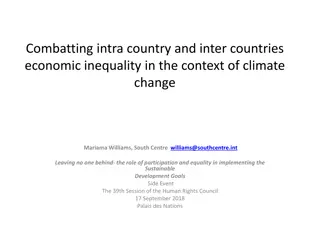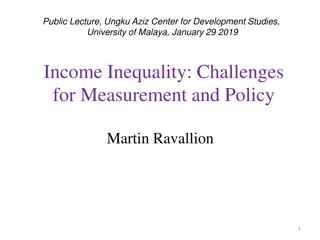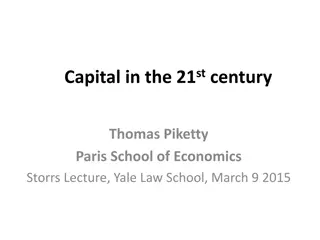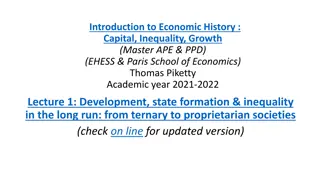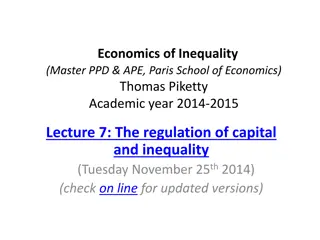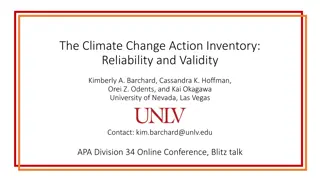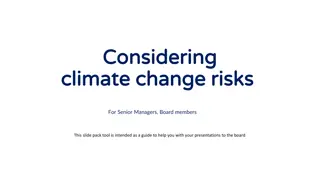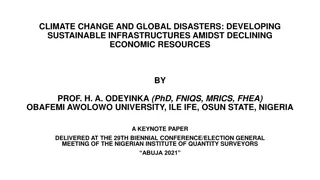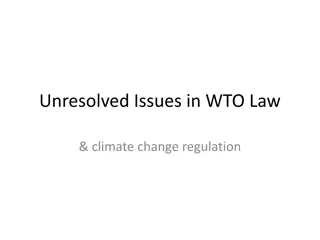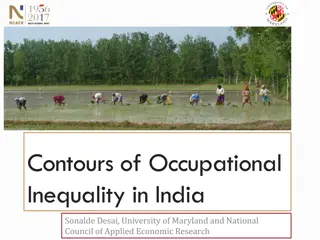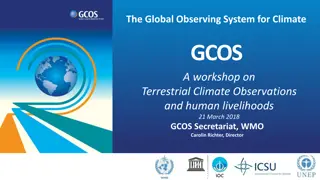Global Concerns: Climate Change, Inequality, and Influence on Government
Climate change and inequality are identified as top global concerns, with a link to government influence and favoritism highlighted. The connection between people's worries worldwide showcases a concerning asymmetrical influence that relates to issues like waste in government spending and vested interests impacting health policies. Elites' influence can perpetuate unequal tax structures, contributing to a vicious cycle of inequality and policy capture.
Download Presentation

Please find below an Image/Link to download the presentation.
The content on the website is provided AS IS for your information and personal use only. It may not be sold, licensed, or shared on other websites without obtaining consent from the author.If you encounter any issues during the download, it is possible that the publisher has removed the file from their server.
You are allowed to download the files provided on this website for personal or commercial use, subject to the condition that they are used lawfully. All files are the property of their respective owners.
The content on the website is provided AS IS for your information and personal use only. It may not be sold, licensed, or shared on other websites without obtaining consent from the author.
E N D
Presentation Transcript
Climate change and inequality are among top most concerning global issues Source: 2017 World Economic Forum, Shapers Survey
IS THERE A CONNECTION BETWEEN PEOPLES TOP CONCERNS AROUND THE WORLD? ASYMMETRICAL INFLUENCE
OECD WORK ON INFLUENCE Dr. Mariana Prats Public Sector Integrity Public Governance - OECD
Widespread feeling of governments' acting in their private interests instead of general welfare Source: Democracy Perception Index (2018), Project jointly conducted by Alliance of Democracies, Dalia Research and Rasmussen Global.
Most OECD countries are perceived as showing favouritism in government decisions 7 6 5 4 3 2 1 Source: World Economic Forum, Global Competitiveness Index 2017-2018
Undue influence is related with higher waste of government spending 6 Wastefullness of government spending ITA R = 0.6052 SVN GRC 5 SVK ESP MEX HUN PRT POL LVA ISR USA FRA KOR 4 BEL AUT AUS TUR DNK ISL IRL GBR CAN DEU JPN NLD CHL 3 EST LUX NOR SWE CHE FIN CZE NZL 2 1 0 0 1 2 3 4 5 6 Undue influence Source: World Economic Forum; Executive Opinion Survey 2014-2015
Vested interests of sugar industries reveal harmful effects on health policies Economic model outputs per year by each scenario Source: UK Department of Health, 2015 Report Sugar Reduction: The Evidence for Action
Elites influence can lead to persistent unequal tax structures Political Malapportionment and personal income taxes (% of GDP) Source: IADB Ardanaz and Scartascini, 2011
A vicious, reinforcing, cycle between inequality and policy capture (growing) unequal distribution of wealth and power Consequences Rents for capture group Lower trust in government Delegitimisation of the system Political discontent Incentives and opportunity (access) to influence policy decisions Capture (process) Use of legal and illegal means of undue influence Capture (result) Biased laws, regulations or policies
HOW TO PREVENT AND DEAL WITH ASYMMETRICAL INFLUENCE?
OECD Recommendation on Public Integrity
Recommendation on Principles for Transparency and Integrity in Lobbying Building an effective and fair framework for openness and access, granting fair and equitable access to decision, defining the activity and developing rules and guidelines according to context Enhancing transparency, granting access to information or enabling stakeholders to scrutinise lobbying activities. Fostering a culture of integrity, for example providing clear rules and guidelines of conduct for public officials Designing mechanisms for effective implementation, compliance and review But.. most OECD country members still have no regulations on lobbying
Preventing policy capture four complementary strategies Source: OECD 2017, Preventing policy capture
Main risks, mechanisms and targets Citizens new demands and concerns and risk of distrust Target Executive authorities and burocracy POLICY POLICY EVALUATION AND ACCOUNTABILITY IMPLEMENTATION Political Financing Risks POLICY DEVELOPMENT AND DECISION AGENDA SETTING Lobbying risks Risk INTEREST REPRESENTATION INSTITUTIONS are not representative Political Financing Risks
What is need is an equitable and evidence- informed policy-making process Could rebuild trust in governments and provide democracies with a fresh momentum Could reduce economic cost of biased and badly designed policies Could allow governments to be more independent, redistribute misallocated costs of vested interests and lead to better and more inclusive policies It could strengthen efforts on implementation of the Recommendation on Public Integrity
THREE PILLARS OR PRIORITIES FOR ACTION
Equitable and evidence-informed policymaking process Interest Representation -More and detailed regulations on revolving door -Identification, transparency and accountability of think tanks and NGOs -Reliable evidence and integrity in media/ diffusion -Reinforced capacities of audit and transparence of registers -Timely reporting available to public -Identify future challenges related with digital era of campaigns Institutions-Representative and trade associations -(Digital) organizations of representation by issues Lobbying Political Finance and open parties -Transparent and accountable unions Stakeholder Engagement and Social Accountability
Strengthen Interest Representation Institutions In the political arena: representative and open parties For the economic-labour area: transparent and accountable unions and trade associations In the socio-political/cultural area: organizations of representation by issues.
Improve political finance regulations 38% OECD countries ban anonymous donations to parties only above certain thresholds there is still room for influence of untraceable and shadowy interest Reinforced capacities of audit and transparence of registers Timely reporting available to public Identify future challenges related with digital era of campaigns
Reduce gaps and widen lobbying regulations Only 29% of OECD countries restrict lobbyists from being members of advisory groups More and detailed regulations on revolving door Source: OCDE 2013 Identification, transparency and accountability of think tanks and NGOs Reliable evidence and integrity in media/ diffusion
THANK YOU mariana.prats@oecd.org









